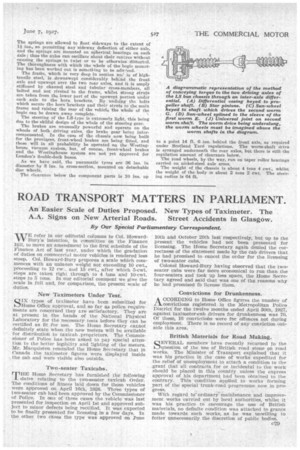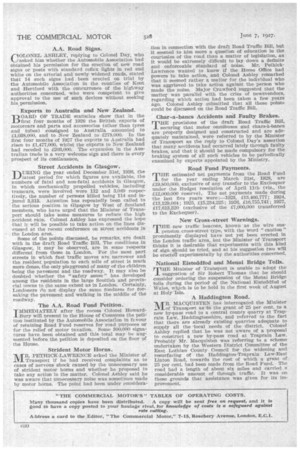ROAD TRANSPORT MATTERS IN PARLIAMENT.
Page 51

Page 52

If you've noticed an error in this article please click here to report it so we can fix it.
An Easier Scale of Duties Proposed. New Types of Taximeter. The A.A. Signs on New Arterial Roads. Street Accidents in Glasgow.
By Our Special Parliamentary Correspondent.
WE refer in our editorial columns to Col. HowardBury's intention, in committee on the Finance Bill, to move an amendment to the first schedule of the kinance Act of last Tear, under which the gradation of duties on commercial moter vehicles is rendered less steep. Col. Howard-Bury proposes a scale which commences with an unladen. weight not exceeding 10 cwt.. proceeding to 12 cw:, and 15 cwt., after which 5-cwt. steps are taken right through to 4 tons and 10-cwt. steps to 5 tons. In our editorial -comment we give the scale in full and; for comparison, the present scale of duties.
New Taximeters Under Test.
SIX types of taximeter have been submitted for Home Office approval, and so far as police requirements are concerned they are satisfactory. They are at present in the hands of the National Physical Laboratory for the necessary tests before they can be certified as fit for use. The Home Secretary cannot definitely state when the new meters will be available for distribution to taxicab .proprietors. The Commissioner of Police has been asked to pay special attention to the better legibility and lighting of the meters. Mr. Macquisten reminded the Home Secretary that in Canada the taximeter figures were displayed inside the cab and were visible also outside.
Two-seater Taxicabs.
THE Home Secretary has furnished the folloiving dates relating to the two-seater taxicab Order. The conditions of fitness laid down for those vehicles were approved on April 16th, 1926. Three types of two-seater cab had been approved by the Commissioner of Police. In one of these cases the vehicle was last presented for inspection on April 1st and approved subject to minor defects .being rectified. It was expected to be finally presented for licensing in a few days. In the other two cases the type was approved on June
10th and October 20th last respectively, but up to the present the vehicles had not been presented for licensing. The Home Secretary again denied the correctness of the statement made by the cab drivers that he had promised to cancel the order for the licensing of two-seater cabs.
Colonel Howard-Bury having observed that the twoseater cabs were far more economical to run than the four-seaters and took up less space, the Home Secretary agreed and said that was one of the reasons why he had promised ro license them.
Convictions for Drunkenness.
A CCORDING to Home Office figures the number of convictions registered in the Metropolitan Police District for the twelve months ended April 50th, 1927, against taximeter-cab drivers for drunkenness was 70. Of these, 16 convictions were for offences not during employment. There is no record of any conviction outside this area.
• British Materials for Road Making.
SEVERAL members have recently returned to the question of the use of British road stone en road works. The Minister of Transport explained that it was his practice in the ease of works expedited for the relief of unemployment to attach a condition to the grant that all contracts for or incidental to the work should be placed in this country unless the express approval of his department had been obtained to the contrary. This condition applied to works forming part of the special trunk-road programme now in progress. With regard to ordinary'thailitenance and improvement works carried out by local authorities, whilst it was his practice to encourage the use of British materials, no definite condition was attached to grants made towards such works, as he was unwilling to fetter unnecessarily the discretion of public bodies. A.A. Road Signs.
COLONEL ASHLEY, replying to Colonel Day, who L./asked him whether the Automobile Association had obtained his permission for the erection of new road signs or posts with standard reflex lights in red and white on the arterial and newly widened roads, stated that 14 such signs had been erected on trial by the Automobile Association in the counties of Kent and Hertford with the concurrence of the highway authorities concerned, who were competent to give approval to the use of such devices without seeking his permission.
Exports to Australia and New Zealand.
BOARD OF TRADE statistics show that in the first four months of 1926 the British exports of motorcars and parts, and accessories (other than tyres and tubes) consigned to Australia amounted to £1,038,000, and to New Zealand to 1278,000. In the first four months of 1927 the exports to Australia had risen to 11,477,000, whilst the exports to New Zealand had receded to 1203,000. The expansion in the Australian trade is a very welcome sign and there is every Prospect of its continuance, Street Accidents in Glasgow.
TAURING the year ended December 31st, 1926, the ..1—■ latest period for which figures are 3.vaiLable, the numbers of fatal and non-fatal accidents in Glasgow, in which mechanically propelled vehilcles, including tramcars, were involved were 112 and 3,049 respectively, the number of persons killed being 114 and injured 3,313. Attention has repeatedly been called to the serious position in Glasgow by West of Scotland members, who have urged that the Minister of Transport should take some measures to reduce the high accident rite. Colonel Ashley has expressed the hope that it will be possible to take action on the lines discussed at the recent conference on street accidents in the London area.
Some of the points discussed, he remarks, are dealt with in the draft Road Traffic Bill. The conditions in Glasgow, it may be observed, are in some respects different from those in London. For the most part streets in which fast traffic moves are narrower and the resident population to each mile of street is much more dense, the only playground of many of the children being the pavement and the roadway. It may also be doubted whether the "safety sense" has developed among the residents in the large Scottish and provincial towns to the same extent as in London. Certainly, Londoners cl.o not display the same fondness for forsaking the pavement and walking in the middle of the roadway.
The A.A. Road Fund Petition.
TMIIEDIATELY after the recess Colonel Howard
Bury will present to the House of Commons the petition instituted by the Automobile Association in favour of retaining Road Fund reserves for road purposes or for the relief of motor taxation. Some 300,000 signatures have been obtained and this total may be augmented before the petition is deposited on the floor of the House.
Strident Motor Horns.
MR.. PETRICK-LAWRENCE asked the Minister of Transport if he had received complaints as to cases of nervous shock caused by the unnecessary use of strident motor horns and whether he proposed to take any action in the matter. Colonel Ashley said he was aware that unnecessary noise was sometimes made by motor horns. The point had been under considera
tion in connection with the draft Road Traffic Bill, but it seemed to hint more a question of education in the courtesies of the road than a matter of legislation, -as it would be extremely difficult to lay down a definite and enforceable standaid of noise. Mr. PethickLawrence wanted to know if the Home Office had powers to take action, and Colonel Ashley remarked that it seemed rather a matter for the individual who was aggrieved to take action against thefl person who made the noise. Major Crawford suggested that the matter was parallel with the cries of newsvendors, regarding which action had been taken a few years ago. Colonel Ashley submitted that all these points could be discussed on the Road Traffic Bill.
Char-a-banes Accidents and Faulty Brakes.
T.11E provisions of the draft Road Traffic Bill,
• securing that motor omnibuses and chars-a.banes are properly designed and constructed and are adequately maintained, were referred to by the Minister of Transport as the reply to Colonel Day's assertion that many accidents had occurred lately through faulty brakes, and that it should be made compulsory for the braking system of all suchvehicles to be periodically examined by experts appointed by the Ministry.
Road Fund Payments.
THE estimated net payments from the Road Fund for the year ending March 31st, 1928, are £19,800,000, exclusive of any transfer to the Exchequer under the Budget resolution of April 11th (viz., the £12,000,000 reserve). The net payments made during the last five years were:-1923, £13,466,777; 1924, £13,129,064; 1925, £15.234,225; 1926, 116,755,741; 1927, £17,613,320 (exclusive of the £7,000,000 transferred to the Exchequer).
New Cross-street Warnings.
91HE new traffic beacons, known as the wire sus pension cross-street type, with the word "caution" prominently displayed have not yet been erected in the London traffic area, but the Minister of Transport thinks it is desirable that experiments with this kind of sign should be tried, and at his suggestion two will be erectea experimentally by the authorities concerned.
National Eisteddfod and Menai Bridge Tolls.
T-14E Minister of Transport is unable to adopt the suggestion of Sir Robert Thomas that he should consider ordering the suspension of the Menai Bridge tolls during the periodof the National Eisteddfod of Wales, which is to be held in the first week of August at Holy Isle.
A Haddington Road.
B.MACQUISTEN has interrogated the Minikes ..1.V.Lof Transport as to the grant of 25 per cent. to a new by-pass road to a central county quarry at Traprain Law, Haddingtonshire, and referred to the fact that there are already existing quarries adequate to supply all the -local needs of the district. Colonel Ashley replied that he was not aware of a proposal to construct a new by-pass road at Traprain Law. Probably Mr. Macquisten was referring to a scheme undertaken by the Western District Committee of the East Lothian County Council for the widening and resurfacing of the HadclingtoteTraprain Law-East Linton Road, towards the cost of which a grant of 25 per cent, had been made from the Road Fund. The road had a length of about six miles and carried a considerable amount of through traffic. It was on these grounds that assistance was given for its improvement.












































































































